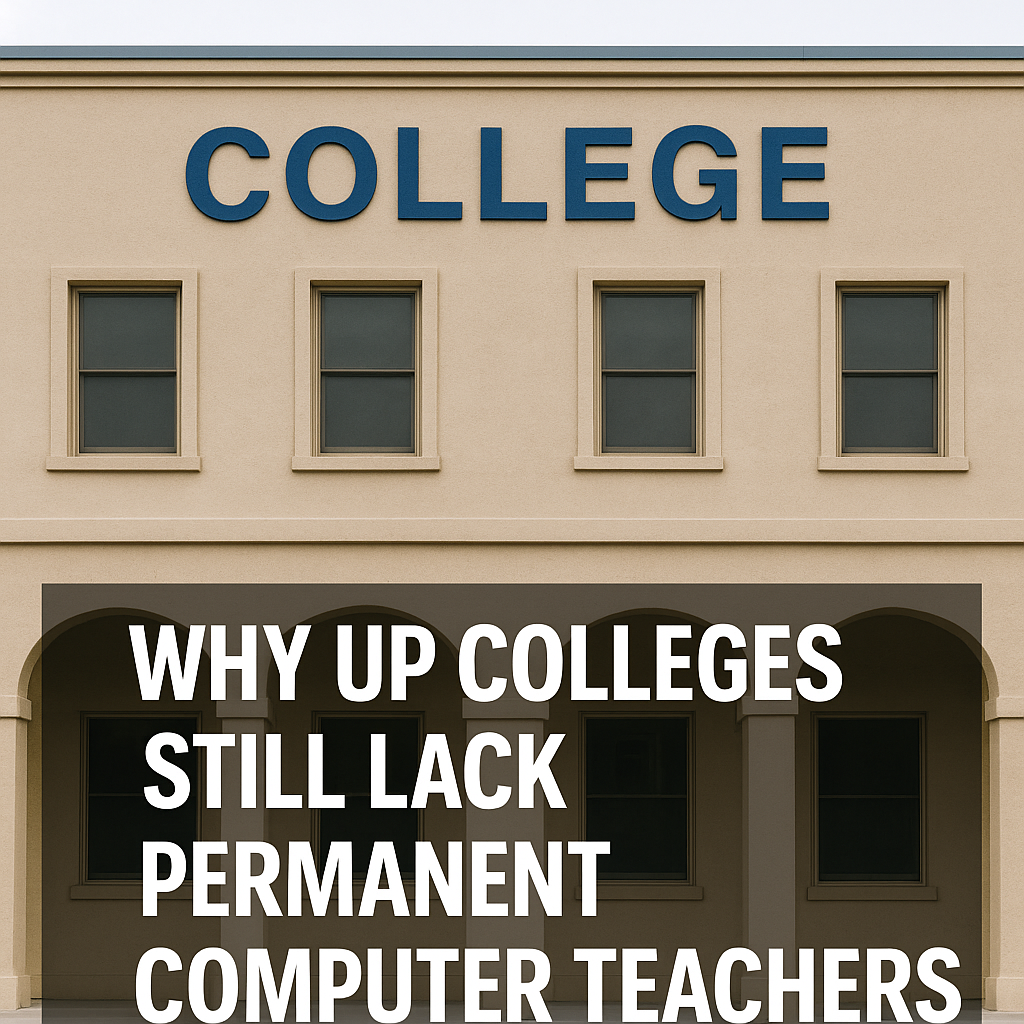In today’s digital age, where technology drives progress, the absence of permanent computer teachers in Uttar Pradesh (UP) Board colleges is a glaring issue. Despite the critical role of computer education, many government-run schools and colleges under the UP Board have struggled with unfilled computer teacher vacancies for years. This article dives deep into the reasons behind this persistent problem, its impact on students, and why urgent action is needed to appoint permanent computer teachers.
The Growing Importance of Computer Education
Computers are no longer a luxury; they are a necessity. From coding to digital literacy, computer education equips students with skills for the modern workforce. In Uttar Pradesh, where millions of students rely on the UP Board for quality education, the lack of permanent computer teachers is a significant barrier to preparing students for a tech-driven future.
In 2018, the UP government made computer education mandatory in secondary schools, recognizing its importance. Yet, despite this policy, many schools still lack qualified, permanent computer teachers. This gap leaves students without the foundational skills needed for careers in technology, a sector that contributes significantly to India’s economy.
Fact: According to a 2024 report, over 85,000 teaching posts, including computer teachers, remain vacant in UP’s basic and secondary education sectors. Times of India, February 6, 2024
The Persistent Vacancy Problem in UP Board Colleges
The issue of unfilled computer teacher vacancies is not new. For years, UP Board colleges have operated with temporary or contractual teachers, if they have any at all. According to a proposal sent to the UP government in 2024, there are plans to recruit 2,355 computer teachers for government-run high schools and inter colleges. However, the process has been delayed due to outdated recruitment rules and bureaucratic hurdles.
In May 2025, the UP government announced plans to recruit 5,000 computer teachers on a contractual basis for classes 9 to 12. While this is a step forward, the emphasis on contractual positions rather than permanent ones raises concerns about job security, teacher motivation, and long-term educational quality.
Why Are Vacancies Not Being Filled?
Several factors contribute to the delay in filling permanent computer teacher positions:
- Outdated Recruitment Rules: The eligibility criteria for computer teachers have not been updated to reflect modern qualifications. For example, a 2024 proposal suggested including MCA degree holders as eligible candidates, but the rules are still under review.
- Bureaucratic Delays: Proposals for recruitment, such as the one sent by the UP Directorate of Education to the UP Public Service Commission (UPPSC), often get stuck in administrative processes.
- Lack of Prioritization: Despite the mandatory inclusion of computer education, the focus has been on filling vacancies for core subjects like Math and Science, leaving computer education understaffed.
- Budget Constraints: Permanent positions require long-term financial commitments, which the government has been hesitant to make, opting instead for cheaper contractual hires.
Did You Know? A 2024 Hindustan Times report highlighted that the UP government is considering amending recruitment rules to allow MCA degree holders to apply for LT-grade computer teacher posts, potentially opening up opportunities for thousands of qualified candidates.
The Impact of Vacant Computer Teacher Posts
The absence of permanent computer teachers has far-reaching consequences for students, teachers, and the education system as a whole.
1. Compromised Student Learning
Without qualified teachers, students miss out on structured computer education. Many schools rely on temporary staff or teachers from other subjects to cover computer classes, leading to inconsistent teaching quality. This affects students’ ability to learn essential skills like programming, data analysis, and digital literacy, which are in high demand in industries like IT, finance, and e-commerce.
2. Increased Workload for Existing Staff
Teachers from other disciplines are often tasked with teaching computer science, despite lacking expertise. This not only compromises the quality of education but also increases the workload for these teachers, leading to burnout and reduced job satisfaction.
3. Widening the Digital Divide
Uttar Pradesh has a significant rural population, and many students in rural areas rely on government schools for education. The lack of computer teachers exacerbates the digital divide, leaving rural students at a disadvantage compared to their urban counterparts who have access to private institutions with better resources.
4. Demotivation Among Aspiring Teachers
Thousands of candidates with degrees in computer science, IT, or related fields are waiting for permanent teaching positions. The delay in recruitment discourages these professionals, many of whom seek opportunities elsewhere or shift to private sector jobs.
Statistic: As of 2024, there are 11,246 vacant LT-grade teacher posts in UP government colleges, including computer teachers, according to the UP Education Service Selection Commission.
The Need for Permanent Teachers
Permanent teachers bring stability, expertise, and long-term commitment to the education system. Here’s why appointing permanent computer teachers is crucial:
- Consistency in Teaching: Permanent teachers can develop long-term curricula and build relationships with students, fostering a conducive learning environment.
- Professional Development: Permanent positions allow teachers to pursue advanced training and certifications, improving their teaching quality.
- Job Security: Permanent roles provide financial stability, encouraging teachers to stay in the profession and contribute to educational reforms.
- Boost to Digital Education: With qualified, permanent teachers, UP Board colleges can implement robust computer education programs, aligning with the National Education Policy (NEP) 2020’s emphasis on technology.
Recent Developments and Hope for the Future
In 2025, the Yogi Adityanath-led UP government took a significant step by proposing the recruitment of 5,000 computer teachers for secondary schools. This decision aims to integrate computer science into the curriculum for classes 9 to 12, a move that has been widely welcomed. However, the reliance on contractual positions has sparked debates about job security and long-term impact.
Additionally, the UP Education Service Selection Commission (UPESSC) is working on filling 44,670 TGT and PGT posts, some of which include computer teachers. The inclusion of modern qualifications like MCA degrees in the eligibility criteria is a positive sign, indicating that the government is adapting to the needs of the digital era.
What Can Be Done?
To address the issue of vacant computer teacher posts, the following steps are essential:
- Update Recruitment Rules: The government must finalize amendments to include qualifications like MCA, B.Tech, and other relevant degrees.
- Streamline the Recruitment Process: Reducing bureaucratic delays and expediting the UPPSC’s recruitment process will ensure timely appointments.
- Prioritize Permanent Positions: The government should focus on filling permanent posts to ensure long-term stability in the education system.
- Increase Funding: Allocating a larger budget for education will allow the government to hire more permanent teachers and improve infrastructure like computer labs.
- Teacher Training Programs: Investing in training programs for existing teachers can bridge the gap until permanent positions are filled.
Conclusion
The absence of permanent computer teachers in UP Board colleges is a critical issue that demands immediate attention. In an era where technology is reshaping the world, Uttar Pradesh cannot afford to lag in providing quality computer education. The recent announcement of 5,000 contractual teacher positions is a step in the right direction, but the focus must shift toward permanent appointments to ensure long-term benefits for students and the education system.
By addressing bureaucratic hurdles, updating recruitment rules, and prioritizing permanent positions, the UP government can empower its youth with the skills needed to thrive in a digital world. The time to act is now—let’s ensure that every UP Board student has access to qualified, dedicated computer teachers who can guide them toward a brighter, tech-savvy future.
Call to Action: Stay updated on UP Board computer teacher recruitment by visiting the official UPPSC website or following trusted news sources. If you’re an aspiring teacher, prepare for upcoming exams and advocate for permanent teaching positions!

